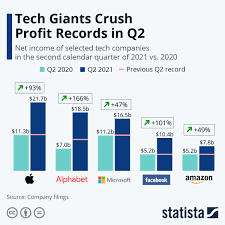The Influence of Big Tech Companies in Today’s Digital Landscape
In the modern era, big tech companies have become synonymous with innovation, disruption, and influence. These multinational corporations wield immense power and shape the way we interact with technology on a daily basis.
From Silicon Valley giants like Apple, Google, Facebook (now Meta), Amazon, and Microsoft to Chinese tech behemoths like Alibaba and Tencent, these companies dominate various sectors of the digital landscape. They provide a wide array of products and services that have fundamentally transformed how we communicate, shop, work, and entertain ourselves.
The Impact on Society
While big tech companies have revolutionised many aspects of our lives for the better, their influence is not without controversy. Issues such as data privacy concerns, antitrust scrutiny, market monopolisation, and ethical implications of artificial intelligence have sparked debates about the extent of their power.
Moreover, the sheer scale and reach of these companies raise questions about accountability and transparency. As they continue to expand their operations globally, governments and regulatory bodies are grappling with how to effectively regulate their activities while balancing innovation with consumer protection.
Economic Powerhouses
Big tech companies are not only technological innovators but also economic powerhouses. Their market capitalisations often surpass those of traditional industries, making them key players in driving economic growth and job creation.
However, concerns about income inequality and the concentration of wealth in the hands of a few tech billionaires persist. Critics argue that these companies’ dominance stifles competition and hampers smaller businesses from thriving in an increasingly digital-centric economy.
The Future of Big Tech
As big tech companies continue to push boundaries with cutting-edge technologies such as artificial intelligence, blockchain, virtual reality, and quantum computing, it is clear that their influence will only grow in the years to come.
It remains to be seen how regulators will navigate the complex landscape of big tech regulation while balancing innovation with safeguarding consumer rights. The evolution of digital technologies will undoubtedly shape our future interactions with big tech companies and redefine the boundaries of what is possible in the digital age.
Advantages of Big Tech Companies: Innovation, Convenience, Economic Growth, and More
- Big tech companies drive innovation and technological advancement at a rapid pace.
- They provide convenient and user-friendly products and services that enhance our daily lives.
- These companies create job opportunities and contribute significantly to economic growth.
- Big tech firms invest heavily in research and development, leading to breakthrough technologies.
- Their global reach allows for seamless connectivity and communication across borders.
- Big tech companies often lead philanthropic initiatives, supporting social causes and community development.
Key Concerns Surrounding Major Tech Corporations: Data Privacy, Market Dominance, AI Ethics, and Political Influence
Big tech companies drive innovation and technological advancement at a rapid pace.
Big tech companies play a crucial role in driving innovation and technological advancement at a rapid pace. Through substantial investments in research and development, these companies continuously push the boundaries of what is possible in the digital realm. Their cutting-edge technologies not only enhance efficiency and convenience for consumers but also pave the way for new industries and opportunities. By fostering a culture of creativity and experimentation, big tech firms inspire smaller startups and entrepreneurs to innovate, ultimately fuelling progress and shaping the future of technology.
They provide convenient and user-friendly products and services that enhance our daily lives.
Big tech companies offer a significant advantage by providing convenient and user-friendly products and services that seamlessly integrate into our daily routines, enhancing the way we live, work, and communicate. From intuitive mobile applications to smart home devices, these innovations simplify tasks, improve efficiency, and ultimately enrich our overall quality of life. Their commitment to user experience and accessibility ensures that technology becomes more accessible to a wider audience, empowering individuals to navigate the digital landscape with ease and confidence.
These companies create job opportunities and contribute significantly to economic growth.
Big tech companies play a crucial role in job creation and economic development, contributing significantly to the growth of local and global economies. By offering a wide range of employment opportunities across various sectors, these companies not only drive innovation but also provide stable and well-paying jobs for a diverse workforce. Their presence in the market stimulates economic activity, fosters entrepreneurship, and supports the development of ancillary industries, ultimately leading to a more robust and dynamic economy.
Big tech firms invest heavily in research and development, leading to breakthrough technologies.
Big tech companies are renowned for their substantial investments in research and development, which often result in groundbreaking technological advancements. By allocating significant resources to innovation, these firms drive progress and push the boundaries of what is achievable in the digital realm. Their commitment to R&D not only fosters a culture of continuous improvement but also enables the creation of cutting-edge technologies that have the potential to revolutionise industries and enhance our daily lives. The emphasis on research and development underscores big tech companies’ dedication to staying at the forefront of technological innovation and shaping the future of technology.
Their global reach allows for seamless connectivity and communication across borders.
Big tech companies’ global reach enables seamless connectivity and communication across borders, facilitating instant interactions and collaborations on a scale never seen before. Through their advanced technological infrastructure and platforms, individuals, businesses, and communities worldwide can overcome geographical barriers to exchange ideas, share information, and foster meaningful relationships regardless of their physical location. This interconnectedness not only promotes cultural exchange and understanding but also drives innovation and economic growth on a global scale.
Big tech companies often lead philanthropic initiatives, supporting social causes and community development.
Big tech companies often demonstrate a strong commitment to social responsibility by spearheading philanthropic initiatives that support various social causes and contribute to community development. Through their substantial resources and global reach, these companies have the capacity to make a significant impact on issues such as education, healthcare, environmental conservation, and disaster relief efforts. By leveraging their technological expertise and financial capabilities for the greater good, big tech companies play a vital role in addressing societal challenges and fostering positive change in communities around the world.
Data privacy concerns
Data privacy concerns surrounding big tech companies are a significant issue in today’s digital landscape. With the collection of extensive user data, there is a growing unease about the transparency and security measures in place to safeguard this information. Users worry about how their personal data is utilised, shared, and potentially exploited by these tech giants. The potential for data breaches, misuse of information for targeted advertising, and even manipulation of user behaviour underscore the pressing need for stringent data protection regulations and increased accountability from these companies.
Market monopolisation
In the realm of big tech companies, a significant concern revolves around market monopolisation. Certain industry giants have faced allegations of stifling competition and engaging in monopolistic behaviours that restrict consumer choice. By dominating key sectors and establishing near-unchallenged market positions, these companies can dictate terms, limit innovation from smaller players, and potentially harm overall market diversity. Such practices not only raise antitrust issues but also pose a threat to fair competition and consumer welfare in the digital landscape.
Ethical implications of AI
The ethical implications of artificial intelligence (AI) used by big tech companies are a growing concern, particularly regarding bias, accountability, and potential misuse. AI systems can inadvertently perpetuate and even exacerbate existing biases if not carefully designed and monitored. This can lead to unfair treatment of individuals based on race, gender, or other characteristics. Additionally, the opacity of AI algorithms often makes it difficult to hold these systems accountable for their decisions, raising questions about transparency and responsibility. Furthermore, the potential misuse of AI technologies for surveillance or manipulative practices poses significant risks to privacy and autonomy, necessitating stringent ethical guidelines and regulatory oversight to ensure these powerful tools are used responsibly.
Influence on politics
Big tech companies’ influence on politics has raised significant concerns regarding their impact on democratic processes. The role of these companies in shaping public discourse and their involvement in elections have become focal points of debate. With the ability to control the flow of information and reach vast audiences, there are worries about the potential manipulation of public opinion and the spread of misinformation. The concentration of power in the hands of a few tech giants has led to questions about transparency, accountability, and the overall health of democratic societies in the digital age.



